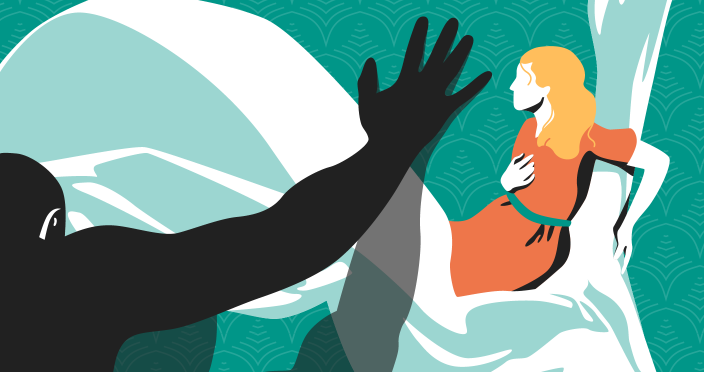Here is a short summary of Othello Act 3, Scene 4:
In the beginning of the scene, Desdemona confesses her fear of losing Othello’s love. Meanwhile, he grows increasingly suspicious and asks his wife about the lost handkerchief, which she’s unable to find. Iago, in his turn, continues fueling Othello’s jealousy.
Read on for more details. You will discover an in-depth analysis of Othello Act 3, Scene 4, right after the comprehensive summary.
💚 Othello Act 3 Scene 4 Summary
The scene starts with Desdemona, Emilia, and the clown speaking about Cassio. Desdemona asks the clown if he knows where Cassio lodges; she wants him to go and find Cassio so that they can talk as she has some good news to share. Desdemona hopes that Othello will reinstate Cassio very soon.
When the clown exists, Desdemona turns to Emilia and asks if she knows the whereabouts of her handkerchief. Emilia doesn’t tell the truth. Desdemona continues by saying that she would rather lose the purse full of money. She then states that if Othello would be jealous, it could make him think badly.
Othello enters the scene, and Desdemona comments that she will not leave him alone until Cassio speaks to him. Othello talks nicely to his wife and gives compliments about the softness of her skin. However, in the end, he requests her handkerchief. Desdemona tells the truth, “I have it not about me.”
Then Othello tells the handkerchief’s story. His mother got it from an Egyptian charmer as the charmer claimed that it would help her subdue his father. However, if she lost it or gave it to someone, her husband would leave her. Othello continues by explaining that when his mother was dying, she gave the handkerchief to him. He tells Desdemona that, “There’s magic in the web of it.”
Desdemona tries to change the topic and asks her husband to see Cassio. Yet, Othello demands to know the handkerchief’s location. When he exists, Emilia questions whether Othello is jealous. Desdemona says she has never seen him this way before.
The next moment, Iago and Cassio enter the scene. Emilia explains that Othello is left in angry spirits. Desdemona does not think that her husband is capable of jealousy. She feels that the state of affairs made him sad. However, Emilia insists that Othello is jealous.
Desdemona exits the scene with Emilia to look for Othello, and Bianca enters. She was looking for Cassio because he has not been coming to her for seven days and nights. Cassio apologizes and gives her Desdemona’s handkerchief. Bianca assumes that this token has been gisted to Cassio by a woman, but he claims that he found the cloth in his chamber.
🎭 Active Characters
Desdemona, Emilia, the Clown, Othello, Cassio, Bianca
🔥 Active Themes
📗 Othello Act 3 Scene 4 Analysis
By Act 3 Scene 4, Othello is sure that Desdemona and Cassio are having an affair. At first, Emilia and Desdemona are unaware of his destructive jealousy. Additionally, both of them do not know that Iago is the one orchestrating it.
The clown opens the scene, and it provides some comic relief. However, it quickly disappears as Desdemona keeps insisting on speaking to Othello about Cassio. As the audience knows about Iago’s plan, it creates additional tension. In this scene, the clown continues making puns. For instance, he plays with the word “lie.” He uses it in two different ways – to rest and to tell untruths.
When the clown exists, Desdemona remembers about her handkerchief. She foresees what Othello could have thought if he was a jealous man. She says that the absence of it would “put him into ill-thinking.” A second later, she drops this topic and tells Emilia that she will make sure Othello speaks to Cassio. The tension increases because the audience knows about Iago’s plan and how it can hurt Desdemona.
Othello enters the scene and tries to pretend that everything is the way it used to be. Yet, the conversation quickly escalates. He makes up an illness and requests the handkerchief. When his wife says she does not have it, he tells the story behind the origin of the handkerchief. This piece of cloth is vital as it traces back to his mother. Losing it can cause unfaithfulness and breakup. He accuses Desdemona indirectly by telling this story.
Emilia tries to calm her lady by saying that Othello’s behavior is very typical. As for men, women “are all but food.” This demonstrates different perspectives on gender roles that women show. Emilia is very cynical towards all men as she was married for a more extended period than Desdemona, who does not believe Othello can be jealous. She explains to Desdemona:
But jealous souls will not be answered so.
Othello, Emilia, Act 3, Scene 4
They are not ever jealous for the cause,
But jealous for they’re jealous. It is a monster
Begot upon itself, born on itself.
At the end of the scene, a new character enters the scene. Bianca is very different from everyone else in Othello. She is Cassio’s lover, and her status is deficient in society. Bianca was searching for Cassio because he has not communicated with her in one week. He promises to come and see her. Cassio behaves with Bianca as if he is in love with her. However, when he hands Desdemona’s handkerchief, he asks to replicate it. It means that for Cassio, Bianca is not equal.
Despite that, Bianca is the most liberated female character in the play. She is independent of Cassio and from the way society views her. Bianca asks him about the origin of the handkerchief directly, not trying to pretend like Othello or play games like Iago. Cassio demonstrates honesty as well, even though he is not happy with the accusations.
Cassio explains that the handkerchief appeared in his room, and he does not know to whom it belongs. However, he indeed found the cloth in his room. It is nearly impossible for him not to understand to whom it belongs. He has been a friend and Othello’s companion for way too long not to know that the handkerchief belongs to Desdemona.
Bianca’s appearance in the scene is paramount to the entire play as she allows Shakespeare to emphasize several essential themes. She also demonstrates another feminine social status: Desdemona belongs to the upper class, Emilia to the middle class, and Bianca belongs to the lower one. Even though many critics believe her to be a prostitute, there are no clear indications of that. She also demonstrates true concern and love for Cassio.
Thanks for reading! You can get more information about the play and the following scene via the links below.


